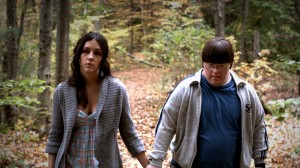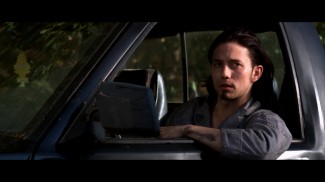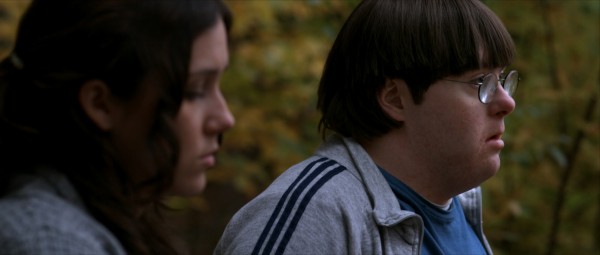INTERVIEW: Director Justin Lerner on his new film, ‘Girlfriend’

Hollywood Soapbox recently exchanged e-mails with writer-director Justin Lerner to get his thoughts on Girlfriend, his provocative new film about a man with Down Syndrome and his quest to find real love in the world. The filmmaker describes his challenges of shooting the indie, working with a nonprofessional lead actor and his reconnection with an old high school friend. Questions and answers have been slightly edited.
Could you talk about how the project evolved from scratch?
It’s a very long story. The brief-ish version is that I had cast Evan Sneider in a small supporting role in my thesis film, The Replacement Child, a short I did to receive my MFA at UCLA Film School. I offered him the role because; a) I knew Evan well in high school and was his friend; b) I knew one of his lifelong ambitions was to become an actor (we were even in a few plays together at Wayland High School in the Boston suburbs, where we both lived and went to school together), and c) I shot the film in Wayland. When the short film did its festival run, audiences really seemed to react positively to Evan’s performance — most people liked the fact that he was playing a role that didn’t evoke any pity or even need to be played by someone with a disability — he played a mean manager of an ice cream shop.
Two people who were particularly impressed with Evan’s timing, humor and acting ability were aspiring indie producers Jerad and Kristina Anderson, who saw my short film at Sundance in 2009 at an event called Windrider Forum. They told me that they were interested in working with me, and together we came up with the idea of making a film centered around a character that could be played by Evan.
So I wrote something with elements that were very close to both my life and Evan’s life — set in a small backwoods American town, much like Wayland, Mass., where we both grew up, and about a young man with Down Syndrome named Evan who falls into some money and uses it to (pursue) a girl he’s always had a thing for. This was around the time of the counrty’s huge economic and housing market collapse, so I wrote that into the story as a way of empowering Evan’s character, now with money in a town where money is scarce, and having him use the situation to take care of (aka pursue a real relationship with) a girl.
Jerad and Kristina formed Wayne / Lauren Film Company, raised the funds (though it was a very small amount, roughly $200,000) and once I had the final draft of the script finished, we hired a casting director named Brad Gilmore and began to look for an actress to play Evan’s love interest, Candy. Amanda Plummer is a good friend of mine, and I had already offered her the role of Evan’s mother, and Jackson Rathbone was close with the Andersons and had agreed to play the role of Russ. We saw a lot of people and finally settled on Shannon Woodward, who is immensely talented and quickly became my partner in filling out the role in what ended up being a very collaborative filming experience that seemed to change and evolve a lot as we shot.

What’s your relationship with Evan Sneider? How did you find him for the movie?
Like I said in the last answer, Evan and I went to high school together from the time my family moved to Wayland when I was 16 until we both graduated, and then we kept in touch after high school and I even saw him on occasion on breaks from school. I always knew he wanted to act, and he was a very persistent (yet always endearing) lobbyist for himself to be cast in one of my films. Looking back at it, the only reason I put him in my short film was because he had called me so many times reminding me that if I ever needed an actor, he was ready and waiting. I remembered him. So, I guess Evan’s story disproves the idea that you should let others do your bidding and not self-promote. I honestly cast him because he was on my mind a lot while writing my short film, from his friendly periodic phone calls and e-mails. Evan is great at keeping in touch with all his friends from high school.
How difficult was the actual shooting of the movie? How long did it take?
The film had 19 shooting days over about a month in the fall of 2009. It was quick and it was a big challenge, as any indie film production is, but particularly challenging because of the micro budget, playing chicken with the New England weather, directing a non-professional lead actor with a developmental disability who, as the days went on, got increasingly more emotionally invested in the role and the outcome of the film, and juggling schedules of the actors (one who was shooting the third installment of the Twilight Saga at the same exact time we were shooting). We edited the film through the winter and submitted a cut to Toronto Film Festival in the spring of 2010 and by July we were invited to have our world premiere there.
Do you see Girlfriend as a movie about Down Syndrome? Did you need to do any research?

Are you happy with the audience/festival response to the movie?
Yes, whether good reactions or bad ones, angry or inspired (and we’ve had all of these), I’m elated that so many people have gotten to see the film, at festivals like Toronto, Moscow, and Galway, in NYC and Boston cinemas, and now on DVD / VOD, etc. The film’s not for everyone, and it challenges you at times to interact with it, draw your own conclusions, follow some morally bankrupt people and decide how you personally come down. But that’s a part of the experience of watching a film that I aim for.
I’m not trying to please every audience member, and I try my best to disallow them from being passive spectators. Of course, I want to engage them in the story and want to keep watching what comes next, but I’m also trying to challenge them, to break them out of their passivity. Maybe it’s by forcing them to identify with someone who does some awful things, maybe it’s by giving some information in a scene but leaving big chunks of information out. But most of all I’m just trying to explore and push the boundaries of what we collectively feel is a narrative film, and new places a narrative can go.
What’s your next project?
I’m in the very early stages of putting together my next feature film, another indie, called The Automatic Hate. It’s the second part of an informal trilogy I’d like to make of “impossible love” or “taboo love” stories, Girlfriend being the first part.
By John Soltes / Publisher / John@HollywoodSoapbox.com
-
Girlfriend is now out on DVD and VOD from Strand Releasing.

